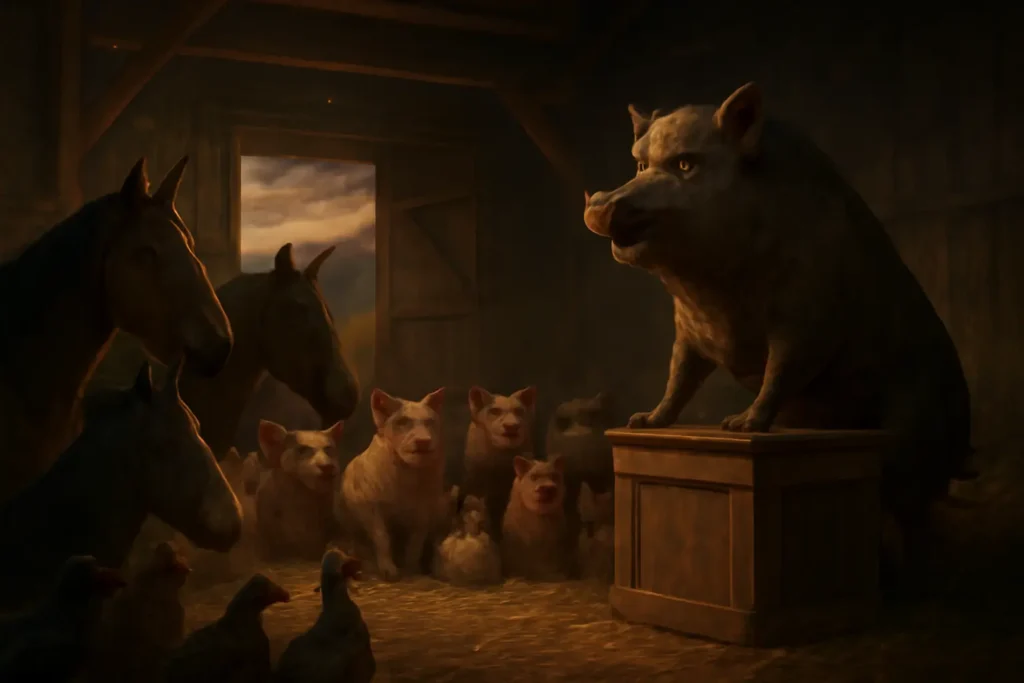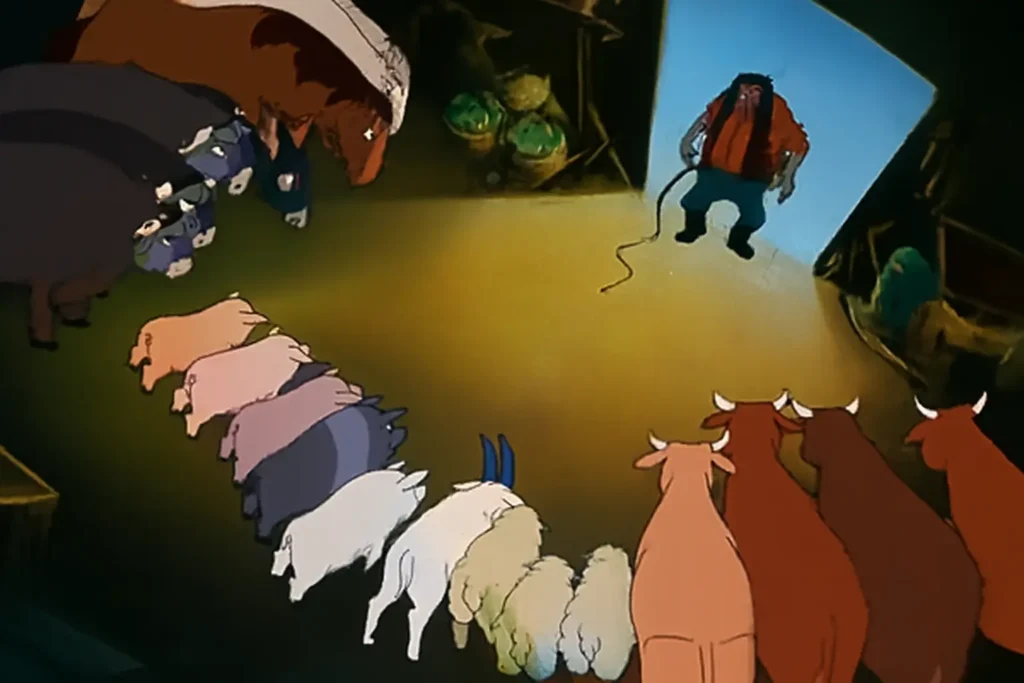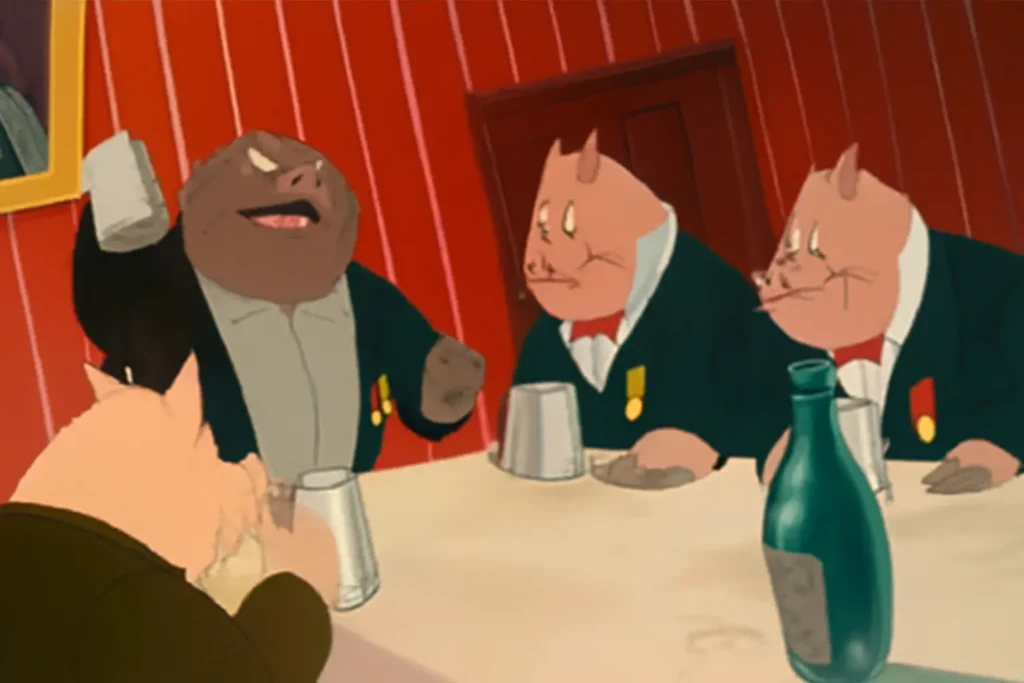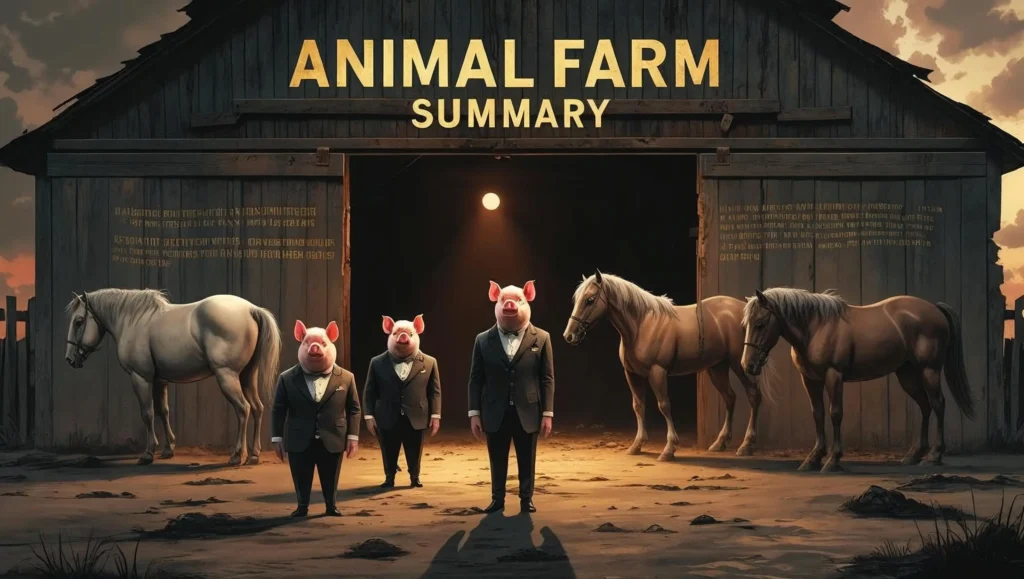Picture this: In 1952, communist fighter pilots were scrambling to shoot down hot air balloons floating across the Iron Curtain. Their target? Not military weapons, but millions of copies of a 95-page children’s book about farm animals. The CIA’s Operation Aedinosaur had turned George Orwell’s Animal Farm into history’s only aerial bombardment of literature. The same book that T.S. Eliot rejected as “unconvincing,” that struggled to find a publisher and sold just 4,500 copies initially, had become so dangerous that entire air forces were mobilized to destroy it.
Fast-forward to today: During Trump’s 2025 inauguration week alone, Animal Farm sales spiked 136%. When Xi Jinping removed China’s presidential term limits in 2018, the government didn’t just ban the book—they banned the letter “N” itself from social media. Hong Kong protesters wave banners reading “All animals are equal, but some are more equal than others.” Ukrainian refugees who lived through Stalin’s terror called themselves “the first Orwell fans,” preserving illegal copies for 65 years as sacred proof of survival.
Whenever a major revolution happens in the world, after every revolution, one book is repeatedly recommended – George Orwell’s Animal Farm. From Bangladesh’s recent revolution to every political uprising worldwide, this “simple fairy tale” about talking pigs becomes the book everyone suddenly needs to read. The demand for this book was so high that after World War II, after 1945, there wasn’t enough paper available to print this book. It has been translated into hundreds of languages and is taught in many schools. Hearing all this, you might think this is a book for intellectuals, perhaps a history book. Not at all! If I tell you in simple terms, or to give its official classification – this is a fantasy book. How did this fairy tale become so popular? Why does this fairy tale book come up repeatedly after every movement and revolution? To understand this, you need to understand the story of Animal Farm.
The Story Begins
The story starts on a farm in England called Manor Farm. Mr. Jones, who owns this farm, and his wife had just finished their day’s work and gone to sleep. As soon as they fell asleep, all the animals on the farm started gathering in the big barn. The wisest and oldest pig on the farm, Old Major, had seen a dream and wanted to tell all the other animals about this dream.
Horses came – Boxer the strong cart-horse and Clover the motherly mare. Benjamin the cynical old donkey came, along with Mollie the pretty white mare who loved sugar and ribbons. Dogs came – Bluebell, Jessie, and Pincher. Other pigs came, including two young boars named Napoleon and Snowball. There was also Squealer, a small fat pig with twinkling eyes who was brilliant at talking. Chickens came, ducks came, even Moses the tame raven. All the animals that were on the farm gathered to hear Old Major’s dream.

Old Major began to speak: “Comrades, I have lived for twelve years, I have seen many things in life, and I don’t think I will live much longer. Before I die, I want to tell you some things. What is the real meaning of our lives? Think about it – we animals are born, we get just enough food to keep us alive, we work until our strength is gone, and then we’re slaughtered. And who causes all this suffering? Man. Man is our only real enemy.
“Man is the only creature that consumes without producing. He doesn’t give milk, he doesn’t lay eggs, he’s too weak to pull a plow. Yet he’s lord of all animals. Think about it – if humans weren’t here, all the crops we grow, all the milk we produce, all the eggs we lay – they could support dozens of horses, hundreds of sheep, all living in comfort. But instead, Man steals the products of our labor.
“The time has come for rebellion! We must work night and day for the overthrow of the human race! Remember this: Whatever goes upon two legs is an enemy. Whatever goes upon four legs, or has wings, is a friend. All animals are equal!“
Then Old Major taught them a song he remembered from his youth – “Beasts of England.” Soon all the animals were singing:
“Beasts of England, beasts of Ireland,
Beasts of every land and clime,
Hearken to my joyful tidings
Of the golden future time…”
Their singing was so loud that Mr. Jones woke up and fired his gun into the darkness. The animals scattered, but the seed of revolution was planted.
The Revolution Begins
Three days later, Old Major died peacefully in his sleep. But his ideas lived on. Napoleon, Snowball, and Squealer developed his teachings into a complete system called “Animalism.” They held secret meetings, teaching the other animals about rebellion.
The most faithful disciples were Boxer and Clover, the cart-horses. Boxer adopted the motto “I will work harder!” and believed everything the pigs told him. But some animals were skeptical. Mollie asked if there would still be sugar and ribbons after the rebellion. The ravens Moses told stories about “Sugarcandy Mountain,” a paradise where animals went when they died.
Mr. Jones, meanwhile, had fallen on hard times. He’d lost money in a lawsuit and started drinking heavily. He neglected the farm, and his workers became lazy and dishonest.

The rebellion came sooner than expected. One Midsummer Eve, Jones went drinking and didn’t return until the next day. The workers forgot to feed the animals. When evening came and the animals were still unfed, they couldn’t stand it anymore. A cow broke into the store-shed, and all the animals began helping themselves. Jones and his men came with whips, but the hungry animals fought back. Within minutes, Jones and all his men were chased off the farm.
The Early Days of Freedom
The animals were free! Their first act was to destroy all symbols of oppression – whips, knives, chains, nose-rings. Everything was burned in a great bonfire. They renamed the farm “Animal Farm” and painted it on the gate.
Snowball, who was best at writing, painted the Seven Commandments on the barn wall:
- Whatever goes upon two legs is an enemy
- Whatever goes upon four legs, or has wings, is a friend
- No animal shall wear clothes
- No animal shall sleep in a bed
- No animal shall drink alcohol
- No animal shall kill any other animal
- All animals are equal
The harvest was the biggest success they’d ever had. Everyone worked according to their ability. Boxer worked harder than ever, his motto becoming legendary. Even the ducks and hens carried tiny wisps of hay. There was no waste, no theft, and the animals were happier than they’d ever imagined possible.
But soon, the first signs of inequality appeared. The milk from the cows disappeared daily. When questioned, Squealer explained: “We pigs don’t actually like milk, comrades. But science has proven that milk contains substances absolutely necessary for pig health. We are the brainworkers – the whole management of the farm depends on us. If we failed in our duty, Jones would come back!”
No one wanted Jones back, so they agreed.
Growing Tensions and External Threats
News of the rebellion spread to neighboring farms. Mr. Frederick of Pinchfield and Mr. Pilkington of Foxwood were alarmed. They spread rumors that the animals were starving and fighting among themselves. But despite their propaganda, “Beasts of England” spread everywhere, and rebellious stirrings affected animals throughout the county.
In October, Jones returned with men from the neighboring farms, armed with sticks and guns. But Snowball had studied military strategy and organized the farm’s defense. In what became known as the Battle of the Cowshed, the animals routed the humans. Snowball was wounded but led the charge courageously. Boxer accidentally killed a stable boy (who later turned out to be only stunned). Both Snowball and Boxer were awarded “Animal Hero, First Class.”
The Power Struggle
As winter came, Napoleon and Snowball disagreed on everything. Snowball wanted to build a windmill to generate electricity and reduce working hours. He had elaborate plans and spoke eloquently about the benefits. Napoleon argued they should focus on food production instead.
Snowball formed committees for everything – the Egg Production Committee, the Clean Tails League, the Wild Comrades’ Re-education Committee. Most failed, but his literacy classes succeeded. Boxer could never get past the letter D, but he kept trying. For simpler animals, Snowball reduced the commandments to a single maxim: “Four legs good, two legs bad!”
Meanwhile, Napoleon took nine puppies from their mothers, supposedly to educate them himself. They disappeared into a loft, and the farm forgot about them.
Napoleon’s Coup
The dispute over the windmill came to a head. At a farm meeting, Snowball gave a passionate speech about the windmill’s benefits. Just as it seemed he would win the vote, Napoleon stood up and let out a high-pitched whimper.
Suddenly, nine enormous dogs – the puppies Napoleon had taken – came bounding into the barn. They chased Snowball off the farm, snapping at his heels. He barely escaped through a hole in the hedge and was never seen again.
The animals were terrified. These were the same puppies they’d known, now grown into fierce attack dogs who obeyed only Napoleon. Napoleon announced that the Sunday meetings were abolished. All decisions would now be made by a committee of pigs, with himself as chairman.
Squealer explained this change: “Leadership is a heavy responsibility, comrades. Sometimes you might make wrong decisions. Suppose you had followed Snowball with his moonshine of windmills – Snowball, who we now know was a criminal! Surely you don’t want Jones back?”
Boxer, troubled but unable to think clearly, voiced what many felt: “If Comrade Napoleon says it, it must be right.” This became his second motto.
The Corruption Deepens
Three weeks later, Napoleon announced that the windmill would be built after all. Squealer explained privately that Napoleon had never opposed it – he had only pretended to, using “tactics” to get rid of the dangerous Snowball. The windmill had actually been Napoleon’s idea, stolen by Snowball!
The animals worked like slaves building the windmill. Napoleon gradually moved into the farmhouse, first just for meetings, then permanently. When animals questioned this, Squealer explained that the Fourth Commandment had always read “No animal shall sleep in a bed with sheets” – they had simply forgotten the last two words.
Napoleon also arranged to sell surplus produce through Mr. Whymper, a human solicitor. When animals questioned trading with humans, Squealer insisted no such resolution had ever been passed – it was probably a lie spread by Snowball.
The Propaganda Machine
The cult of personality around Napoleon grew. He was no longer called simply “Napoleon” but “our Leader, Comrade Napoleon.” Squealer invented titles like “Father of All Animals” and “Terror of Mankind.” A poem by Minimus the poet-pig praised Napoleon as the “Friend of fatherless! Fountain of happiness!”
Every success was credited to Napoleon’s leadership. Hens would say, “Under the guidance of our Leader, Comrade Napoleon, I have laid five eggs in six days!” Spontaneous Demonstrations were held weekly, with parades and speeches praising Napoleon.
Snowball the Scapegoat
In November, a violent storm destroyed the windmill. Napoleon immediately blamed Snowball, claiming he had crept back under cover of darkness. Pig footprints were “discovered,” and Napoleon pronounced a death sentence on the “traitor.”
From then on, whenever anything went wrong – stolen corn, broken eggs, blocked drains – it was blamed on Snowball. Napoleon claimed to smell Snowball’s tracks everywhere. The animals lived in constant fear of this invisible enemy.
The Reign of Terror
Napoleon announced that Snowball had been in league with Jones from the very beginning – even during the Battle of the Cowshed where he’d been wounded fighting for the farm. Squealer rewrote history, claiming Napoleon had been the real hero, crying “Death to Humanity!” and biting Jones’s leg.
Four pigs who had questioned Napoleon’s policies confessed to being in contact with Snowball. Napoleon’s dogs immediately tore their throats out. Then came more confessions: hens admitted to being inspired by Snowball in dreams, a goose confessed to stealing corn, sheep admitted to urinating in the drinking pool on Snowball’s orders. All were executed on the spot.
The surviving animals, led by Clover, huddled together on the hill where the windmill had stood. This wasn’t what they had dreamed of when they rebelled. Clover began to sing “Beasts of England,” but Squealer appeared and announced that the song was banned. The rebellion was complete, he said – the song was no longer needed.
The Final Betrayals
Napoleon discovered that the Sixth Commandment now read “No animal shall kill any other animal without cause” – somehow the last two words had appeared. Napoleon also began drinking alcohol, despite the Fifth Commandment. After a night of drunken revelry, he nearly died, and temporarily banned alcohol under pain of death. But soon the commandment was found to read “No animal shall drink alcohol to excess.”
The most tragic betrayal came with Boxer. The loyal horse had worked himself to exhaustion building the windmill. His twelfth birthday was approaching – retirement age – when he collapsed while hauling stone. His lung was injured, and Napoleon promised to send him to a veterinary hospital.
But when the van came, Benjamin the donkey – who could read – saw the writing on its side: “Alfred Simmonds, Horse Slaughterer and Glue Boiler.” They were taking Boxer to the knacker! The animals ran after the van, shouting for Boxer to escape, but he was too weak. His old strength was gone.
Squealer later claimed Boxer had died peacefully at the hospital, whispering “Napoleon is always right” with his last breath. The van had belonged to the knacker, he said, but was now owned by the vet who hadn’t repainted it yet. Three days later, the pigs held a “memorial banquet” for Boxer – funded by selling him to the glue factory.
The Complete Transformation
Years passed. Most animals who remembered the rebellion were dead. The farm prospered, but somehow the animals weren’t any richer – except the pigs and dogs. There were more pigs now, and they supervised everything while producing nothing themselves.
Young animals learned a revised history where Napoleon had single-handedly liberated the farm. The windmill was completed but used for milling corn to sell, not for the electricity Snowball had promised. Talk of three-day work weeks was dismissed as contrary to “the spirit of Animalism.”
One day, Squealer led the sheep away for a week of private lessons. When they returned, the animals witnessed something shocking: Squealer walking on his hind legs. Then came Napoleon and the other pigs, all walking upright like humans. Napoleon even carried a whip.
The sheep, who had been trained during their week away, now chanted: “Four legs good, two legs BETTER!”
Benjamin led Clover to the barn wall where the Seven Commandments had been written. Now there was only one commandment:
“ALL ANIMALS ARE EQUAL
BUT SOME ANIMALS ARE MORE EQUAL THAN OTHERS”
The Final Scene
Soon the pigs were indistinguishable from humans. They bought radios, telephones, and subscriptions to human magazines. Napoleon appeared in Mr. Jones’s old clothes, walking with a pipe in his mouth.
A week later, neighboring farmers were invited to tour Animal Farm. They admired everything, especially how efficiently the “lower animals” worked for so little food. That evening, both pigs and humans gathered for a celebration dinner in the farmhouse.
The other animals crept to the window and peered in. Around the long table sat farmers and pigs together, playing cards and drinking beer. Mr. Pilkington gave a toast, praising the pigs for their discipline and the low rations they fed their workers. “If you have your lower animals to contend with,” he joked, “we have our lower classes!”
Napoleon responded by announcing that Animal Farm would be known by its original name: “The Manor Farm.” The revolution was over.

Suddenly, a violent quarrel erupted. Napoleon and Pilkington had both played the ace of spades simultaneously – each was cheating. Voices shouted in anger around the table.
The animals outside watched in wonder and horror. Twelve voices were shouting angrily, and they were all alike. The creatures outside looked from pig to man, and from man to pig, and from pig to man again; but already it was impossible to say which was which.
Why This Story Endures
This “fairy tale” is actually one of the most powerful political allegories ever written. Orwell shows us how revolutions can be betrayed from within, how noble ideals can be corrupted by power, and how language itself can be weaponized to control minds. The pigs become what they once fought against, proving that power corrupts absolutely.
Every generation discovers Animal Farm anew because every generation witnesses some version of this betrayal. The names change, the countries change, but the pattern remains heartbreakingly familiar. That’s why, after every revolution, people recommend this book – as both a warning and a guide to recognizing when the cycle begins again.
